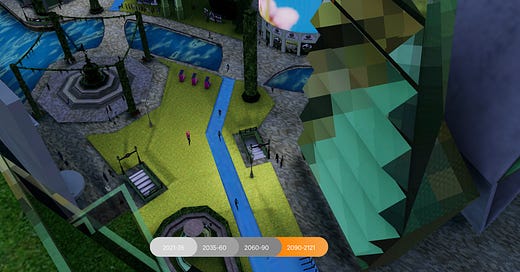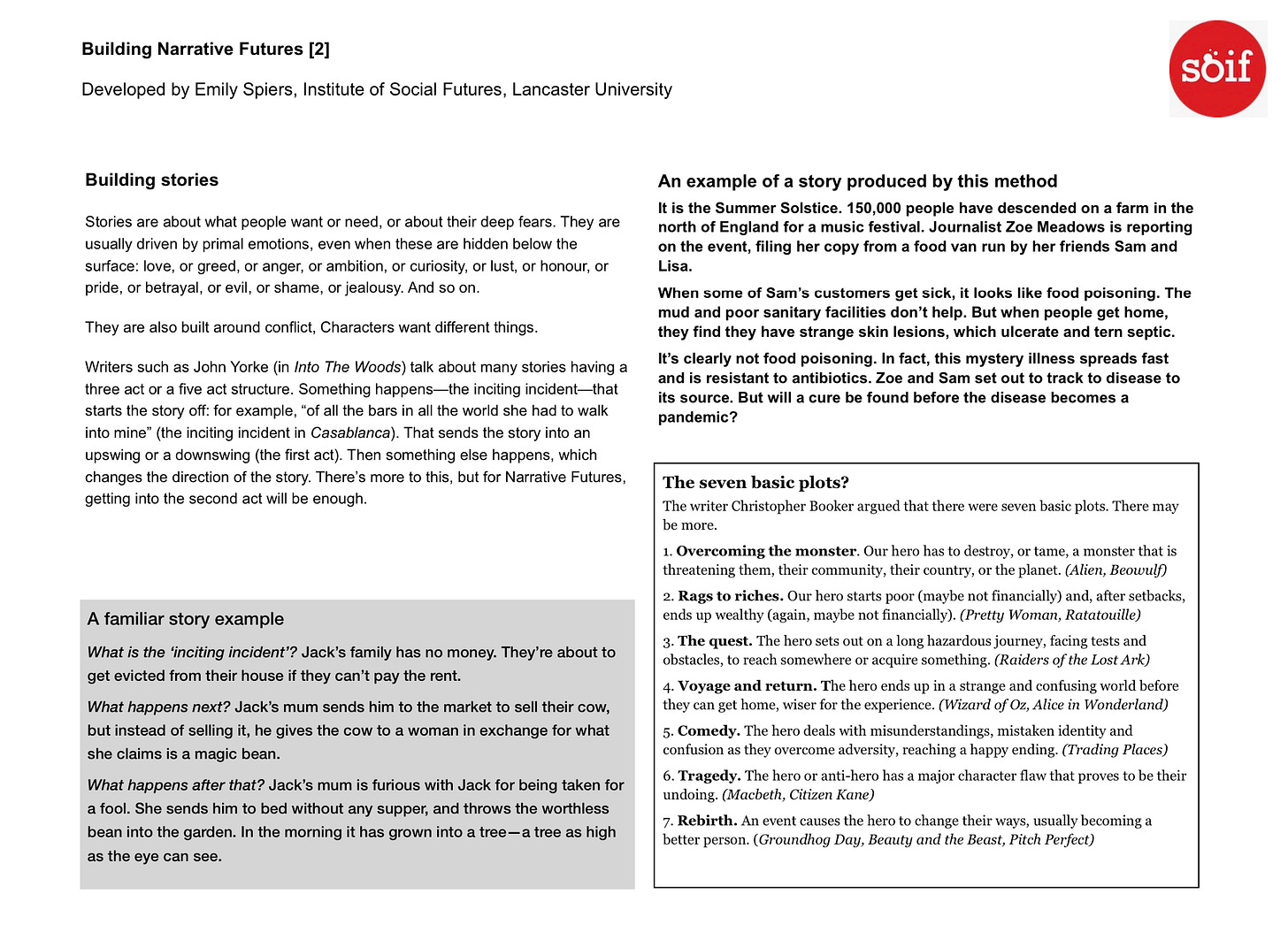Welcome to Just Two Things, which I try to publish daily, five days a week. Some links may also appear on my blog from time to time. Links to the main articles are in cross-heads as well as the story.
#1: Reimagining Piccadilly
One of my favourite projects last year was working with Chatham House to imagine Piccadilly Circus in the year 2120. We designed two exploratory futures workshops to help people make the leap from the present day.
Chatham House is better known as a thinktank that specialises in geopolitical issues, but it has a broader agenda these days. It’s based close to Piccadilly Circus, and the project was intended to mark its centenary. (It was delayed by the pandemic, so they’ve nudged it on a year, which is numerically more pleasing). We also collaborated with the Platform Group, who were commissioned by Chatham House brought the images of the future Piccadilly to life in a video model.
The project has a brief write-up on the SOIF blog, which captures some of the material:
Some striking ideas emerged from the ideation work. The area becomes car-free very quickly. There are green walls, and vertical plant-based artworks which also are homes to birdlife. The famous ‘Eros’ statue, at the heart of today’s Piccadilly, might become a fountain incorporating a hydroponic system to grow fresh local vegetables. This is a “back to the future” future, since the original statue was designed as a drinking fountain.
There are obvious issues in trying to think 100 years ahead. Trends don’t help; it’s too far ahead to imagine technologies, although, looking back, many of our present technologies will still be embedded in the landscape.
We opted for a narrative scenarios method developed by Emily Spiers of the Institute of Social Futures at Lancaster University ((where—declaration of interest—I am on the Advisory Board).
I’m not sure that Emily has written this up formally yet, but for people who are interested I’ve shared here as images the two page instruction that we gave to the groups. I like her approach because its focus on character as the initial building block, with the futures stories emerging from the interplay between them, creates narrative spaces for exploration. It might be thought of as a kind of “warm data” method:
(Source: Emily Spiers, adapted by SOIF)
We coupled this initial narrative futures workshop (pre lockdown) with a second workshop, designed by my colleague Elisa Cecilli, which used a range of ideation techniques to bring the artefacts and settings in the future world to life.
A final round of work, led by the Chatham House team, constructed some timelines between the different future settings, since some were clearly closer to the present than others.
You can see the model, which progresses towards 2121 in 30 year chunks. The project deliberately wanted to open up thinking about the future, rather than construct the types of dismal future that are increasingly easy to write these days. So this future is not about a parched urban centre in which it is too hot to leave the buildings for much of the summer. Instead, it assumes that climate change is a problem that we have both adapted to and responded to. Well, you can judge for yourselves.
#2: After the pandemic
I know that I am writing a lot here at the moment about the transition out of the health pandemic, but it seems like a big deal.
The American magazine Refinery 29 has a piece based on a series of interviews about people anticipating life after the health crisis is over. It’s just a handful of interviews, but it strikes a chord: most of the lockdown conversation has been about the things we miss about the lockdown world (cafes, concerts etc) and not the things we don’t miss about the the pre-lockdown world.
So what about the things we won’t miss, or the things we’ve found during lockdown? They’re not trivial. It’s quite a detailed piece, so these are just a couple of things I noticed.
[Elena] Nicolaou says that returning to her previous routine of offices and trains would make her feel "trapped," and the idea of losing her freedom is terrifying. Brooklyn-based student and freelance journalist Shelby Hall, 23, feels the same. "This time with myself and those closest to me has brought out more of my drive and relentless passion, and I wouldn't want that to go away when things go back to normal," she shares, adding that she fears the common schedule of working 9 to 5 would make her "boring."
One of the interviewees has regrets that she didn’t do more with her time in lockdown, thinking of it as an opportunity she didn’t take.
"Even though logically I know I spent a lot of time this past year just trying to process everything that was going on and not be too hard on myself, in retrospect, I sometimes can't help but beat myself up for 'missed opportunities,'" [Emma Sarron] Webster shares... "I suddenly feel like I don't have time to do all of the things I've been putting off, and I wasted the chance to do them when I had nothing but time."
Another, a work-seeking graduate, was simply dreading the level of social performance you need to maintain the necessary front to get by in everyday conversations:
”As a recent graduate trying desperately to be hired, I'm experiencing extreme anxiety about having to go back out into the world of early 20-somethings on their path to success," says Amanda... “I'm dreading a lunch or a coffee chat where we go around describing our jobs or even complaining about them."
But the deepest thought here is that in the vast social experiment that has been lockdown, things have changed. While most of the people in the piece have a degree of privilege—there’s no one here who’s been working in a warehouse or doing deliveries during the pandemic—the selves that are coming out of lockdown might be different selves from those going in:
Perhaps, though, because it's so hard to put life on pause, when people did manage to do so successfully, it brought them to a place of self-acceptance and peace — why would they want to press play again?... Nicolaou feels similarly, saying: "All of the things that I had set as pillars of my future, I realised were illusions — the trips I thought I would take, the things I'd hoped to accomplish in terms of my dating life by a certain age. Those never existed to begin with, they were never real."
j2t#079
If you are enjoying Just Two Things, please do send it on to a friend or colleague.





